The Marula Oil Infusions Market is projected to grow from USD 1,052.8 million in 2025 to USD 3,562.7 million by 2035, at a CAGR of 13.0%. The moisturizing function will dominate with a 52.5% market share in 2025, while oils will lead the product type segment with a 50.5% share in the same year.
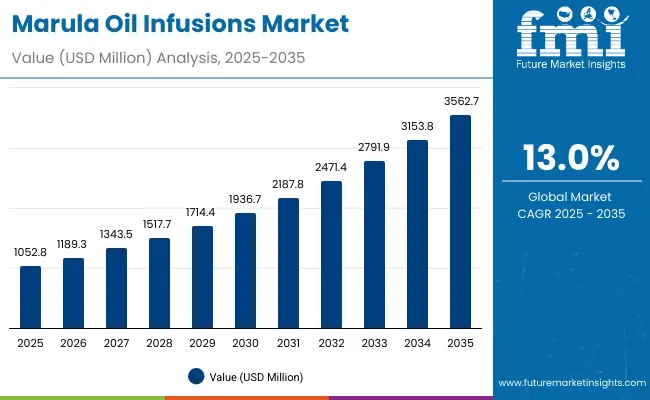
Marula Oil Infusions Market Key Takeaways
| Metric | Value |
|---|---|
| Marula Oil Infusions Market Estimated Value in (2025E) | USD 1,052.8 million |
| Marula Oil Infusions Market Forecast Value in (2035F) | USD 3,562.7 million |
| Forecast CAGR (2025 to 2035) | 13.0% |
During the first five-year phase (2025-2030), the market expands from USD 1,052.8 million to USD 1,936.7 million, adding USD 883.9 million equivalent to around 35% of total decade growth. Growth in this period is fueled by consumer preference for hydration-focused oils, creams, and serums, combined with rising adoption of vegan and clean-label claims.
In the second half (2030-2035), the market accelerates by USD 1,626 million, accounting for 65% of total decade growth, as demand surges in Asia-Pacific and Europe. Expansion is supported by e-commerce platforms, premium brand launches, and dermatologist-tested certifications, making marula oilbased infusions a central part of natural skincare routines globally.
From 2020 to 2024, the Marula Oil Infusions Market gained traction as consumer preference for natural oils and clean beauty intensified. Growth was largely driven by moisturizing and anti-aging functions, supported by the rise of premium and niche indie brands that emphasized transparency, vegan positioning, and ethical sourcing. During this period, the competitive landscape was dominated by ingredient-led skincare innovators, who controlled nearly 70-75% of revenues by targeting both premium and affordable categories. Digital-first adoption remained minimal, contributing less than 10% of total market value.
Demand for Marula Oil Infusions is expected to reach USD 1,052.8 million in 2025, with the revenue mix shifting as vegan-certified claims, organic positioning, and e-commerce sales gain traction. Traditional premium leaders now face growing competition from indie and region-specific brands, especially in Asia-Pacific, where cost-effective, plant-based oils are expanding rapidly. Competitive advantage is shifting from brand heritage alone to innovation in delivery formats, direct-to-consumer engagement, and sustainability-driven differentiation.
Marula oil is rich in fatty acids, antioxidants, and amino acids, making it highly effective for deep hydration and barrier repair. Consumers are increasingly choosing marula oilinfused products over synthetic moisturizers due to its natural origin and fast absorption. This shift toward clean, plant-based hydration solutions is accelerating market adoption, particularly in serums, oils, and creams targeted at dryness and sensitive skin concerns.
The global surge in vegan, cruelty-free, and ethically sourced beauty is boosting marula oil infusions, which align perfectly with consumer values. Brands emphasize fair-trade sourcing from African regions and eco-conscious packaging to attract ethically driven buyers. Younger demographics, especially Gen Z and millennials, are prioritizing products with transparent ingredient lists and sustainability credentials, positioning marula oil as a preferred active in clean-label and premium skincare portfolios.
The market is segmented by function, product type, channel, claim, and region. Functional categories include moisturizing, anti-aging, brightening, and repair, reflecting marula oil’s versatility in addressing hydration, wrinkle reduction, radiance, and barrier-strengthening needs. Based on product type, segmentation covers oils, creams/lotions, serums, and masks. Oils remain the backbone of the market given marula oil’s natural profile, while creams and serums are gaining traction for their daily-use convenience and targeted benefits. Masks, though smaller, are carving a niche in intensive skincare treatments.
Sales channels include e-commerce, pharmacies, mass retail, and specialty beauty stores, providing a mix of digital-first convenience and offline trust. E-commerce is rapidly expanding due to influencer-driven marketing and subscription models, while pharmacies continue to anchor credibility for dermatologist-tested products. Claims-based segmentation spans vegan, natural/organic, clean-label, and dermatologist-tested, underscoring rising demand for ethical, transparent, and science-backed formulations. Vegan certification and fair-trade sourcing resonate strongly with conscious consumers, while dermatologist-tested claims reinforce efficacy in premium categories.
Regionally, the market scope includes North America, Asia-Pacific, and Europe, with notable growth in the United States, China, India, Germany, the UK, and Japan. Asia-Pacific is projected to record the fastest CAGR, supported by growing consumer preference for natural oils and surging adoption of clean beauty in urban centers.
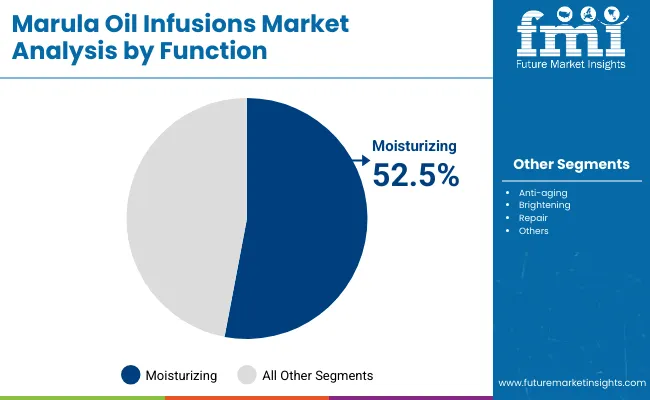
| Function | Value Share% 2025 |
|---|---|
| Moisturizing | 52.5% |
| Others | 47.5% |
The moisturizing segment is projected to contribute 52.5% of the Marula Oil Infusions Market revenue in 2025, establishing it as the dominant function category. This leadership is driven by marula oil’s natural richness in essential fatty acids and antioxidants, which deliver deep hydration and barrier protectionappealing to consumers with dry and sensitive skin.
The segment’s growth is further supported by the rising demand for multi-functional daily-use creams, oils, and serums that combine hydration with anti-aging and brightening benefits. As vegan and clean-label positioning gain traction, moisturizing products with marula oil infusions are expected to remain the backbone of the market throughout the forecast period.
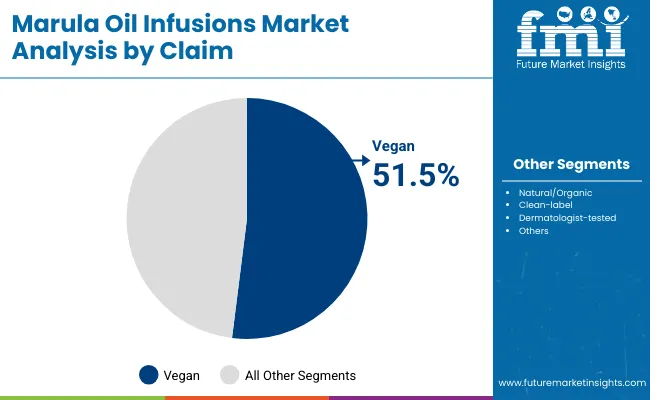
| Claim | Value Share% 2025 |
|---|---|
| Vegan | 51.5% |
| Others | 48.5% |
The vegan segment is forecasted to hold 51.5% of the Marula Oil Infusions Market share in 2025, making it the leading claim category. This dominance is fueled by increasing consumer demand for cruelty-free, ethically sourced, and plant-based skincare, where marula oil’s natural origin aligns perfectly with conscious beauty preferences.
Fair-trade sourcing from Africa, sustainability initiatives, and clean-label positioning, which resonate strongly with Gen Z and millennial consumers, further supports the segment’s growth. As global retailers expand vegan-certified beauty sections, marula oil infusions positioned under this claim are expected to remain at the forefront of adoption.
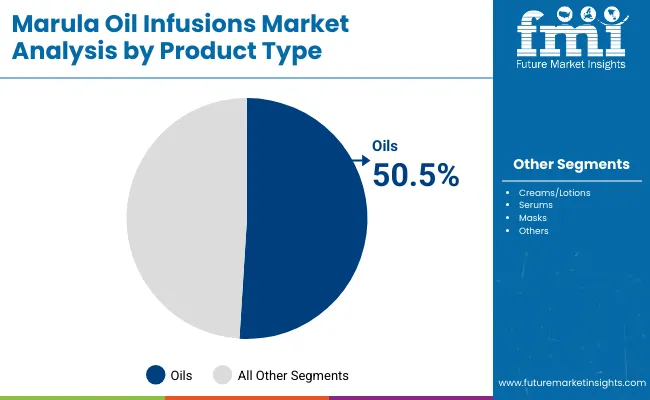
| Product Type | Value Share% 2025 |
|---|---|
| Oils | 50.5% |
| Others | 49.5% |
The oils segment is projected to account for 50.5% of the Marula Oil Infusions Market revenue in 2025, making it the dominant product type. This leadership stems from marula oil’s natural appeal as a pure, cold-pressed ingredient that delivers hydration, anti-aging, and repair benefits in its most concentrated form. Oils are widely used both as standalone products and as base infusions in multipurpose skincare routines.
Growth in this segment is also supported by the popularity of vegan and clean-label claims, which highlight marula oil’s ethical sourcing and minimal processing. As consumers increasingly prefer simple, natural formulations with visible results, oils are expected to remain at the forefront of marula oil infusion adoption through 2035.
Rising Consumer Preference for Natural Oils
The growing shift toward plant-based and natural skincare is a major driver of the Marula Oil Infusions Market. Rich in antioxidants, omega fatty acids, and amino acids, marula oil provides deep moisturization, anti-aging benefits, and skin barrier repair. Consumers increasingly seek alternatives to synthetic moisturizers, fueling demand across premium and mass-market skincare. Its versatility across oils, serums, and creams ensures wide adoption, while clean-label and vegan certifications further enhance its appeal to health-conscious and ethically aware buyers.
Expansion of E-commerce and D2C Models
E-commerce platforms and direct-to-consumer (D2C) brands are accelerating the reach of marula oilinfused skincare products globally. Digital-native beauty startups leverage influencer marketing, subscription kits, and personalized recommendations to capture young consumers, particularly in Asia-Pacific and North America. This trend enables rapid consumer education around marula oil’s benefits, while affordable online launches increase penetration in tier-2 and tier-3 cities. The channel’s scalability and low entry barriers allow both established players and niche brands to expand faster than traditional retail.
Regulatory and Certification Challenges
Despite strong demand, inconsistent global regulations around natural oils and organic certifications pose challenges for the Marula Oil Infusions Market. Differing standards across the USA, EU, and Asia complicate labeling, delay product launches, and increase compliance costs, particularly for smaller brands. Misleading claims regarding purity, sourcing, or therapeutic benefits may also create skepticism among consumers. This lack of harmonization slows cross-border trade and limits the scalability of marula oil products, restraining growth despite rising consumer interest.
Integration into Multi-Functional Skincare Routines
A key trend is the incorporation of marula oil into multi-functional skincare solutions. Consumers increasingly favor simplified routines with products offering hydration, anti-aging, brightening, and repair benefits in one formula. Marula oil’s versatility makes it ideal for hybrid serums, creams, and oils that serve multiple purposes. Brands are innovating with encapsulation technologies, blends with peptides, and sustainable packaging to meet these evolving expectations. This shift toward “skinimalism” is pushing marula oil infusions to the forefront of modern skincare regimens.
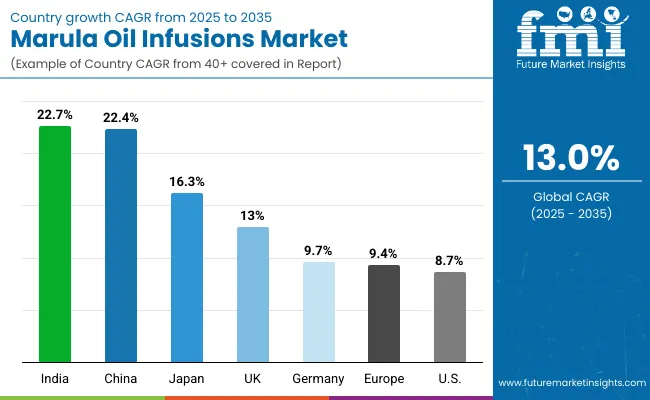
| Countries | Estimated CAGR (2025 2035) |
|---|---|
| China | 22.4% |
| USA | 8.7% |
| India | 22.7% |
| UK | 13.0% |
| Germany | 9.7% |
| Japan | 16.3% |
The global Marula Oil Infusions Market shows clear regional variations in growth speed, shaped by consumer awareness, affordability, and adoption of natural skincare. Asia-Pacific emerges as the fastest-growing region, anchored by India (22.7% CAGR) and China (22.4% CAGR). India’s rapid growth reflects the rising preference for plant-based oils in Ayurvedic and modern skincare regimens, combined with expanding D2C beauty startups targeting tier-2 and tier-3 cities. China’s trajectory is supported by C-beauty innovation, social commerce platforms, and a strong shift toward vegan and natural-certified claims.
Japan (16.3% CAGR) stands out in Asia for its adoption of marula oil in clinical-grade anti-aging and brightening products, where consumer trust in dermatologist-tested skincare drives growth. In Europe, the UK (13.0% CAGR) shows strong adoption of vegan and sustainable beauty, while Germany (9.7% CAGR) remains steady due to its pharmacy-led skincare culture and strict organic certification standards. In North America, the USA (8.7% CAGR) shows moderate growth, reflecting a mature skincare market where marula oil infusions are gaining share through premium and clean-label product launches. Expansion is driven by e-commerce, subscription models, and specialty beauty stores, though growth rates trail behind Asia and Europe.
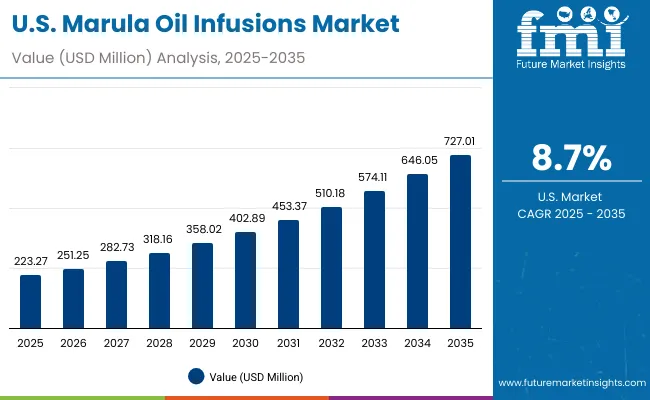
| Year | USA Marula Oil Infusions Market (USD Million) |
|---|---|
| 2025 | 223.27 |
| 2026 | 251.25 |
| 2027 | 282.73 |
| 2028 | 318.16 |
| 2029 | 358.02 |
| 2030 | 402.89 |
| 2031 | 453.37 |
| 2032 | 510.18 |
| 2033 | 574.11 |
| 2034 | 646.05 |
| 2035 | 727.01 |
The Marula Oil Infusions Market in the United States is projected to grow from USD 223.27 million in 2025 to USD 727.01 million by 2035, expanding at a CAGR of 12.5%. Growth is driven by rising demand for moisturizing and anti-aging formulations, which together dominate consumer preference. In 2025, moisturizing accounts for 56.7% of USA market value, supported by marula oil’s role as a natural, fast-absorbing hydrator.
The USA market is also witnessing a shift toward vegan and dermatologist-tested product claims, fueling adoption across both premium and pharmacy-led retail channels. E-commerce growth, subscription skincare models, and influencer-driven awareness are expanding reach, while premium brands emphasize sustainability and fair-trade sourcing of marula oil.
The Marula Oil Infusions Market in the United Kingdom is expected to grow at a CAGR of 13.0% from 2025 to 2035, supported by increasing consumer demand for vegan, clean-label, and sustainable skincare. British consumers are highly receptive to natural oils such as marula, especially in moisturizing and anti-aging formulations that align with the growing “skinimalism” trend.
Growth is further boosted by the strong presence of indie beauty brands and clean-beauty retailers that highlight transparency, ethical sourcing, and eco-friendly packaging. E-commerce platforms and pharmacies are rapidly expanding their marula oilbased portfolios, while premium retailers position it as a luxury natural ingredient. Sustainability-focused initiatives and consumer awareness campaigns continue to reinforce the adoption of marula oil infusions in both mass and premium categories.
India is witnessing rapid growth in the Marula Oil Infusions Market, forecast to expand at a CAGR of 22.7% through 2035the highest among leading countries. This expansion is fueled by rising demand for natural and plant-based skincare, where marula oil resonates with India’s strong Ayurveda-inspired beauty traditions. Consumers are increasingly adopting marula oilinfused products for moisturizing, anti-aging, and repair functions, especially as urban pollution and lifestyle stress accelerate skincare concerns.
Tier-2 and tier-3 cities are becoming growth hubs, as D2C startups and e-commerce platforms introduce affordable serums, creams, and oils infused with marula oil. Awareness campaigns, influencer marketing, and dermatologist endorsements are further accelerating adoption. The shift toward vegan and clean-label claims also appeals strongly to young urban consumers seeking transparency and ethical sourcing.
The Marula Oil Infusions Market in China is expected to grow at a CAGR of 22.4%, making it one of the fastest-expanding markets globally. Growth is driven by increasing consumer preference for vegan-certified and natural skincare, with vegan claims leading at 53.9% in 2025. Chinese consumers are particularly responsive to plant-based oils such as marula for hydration, anti-aging, and repair functions, supported by rising disposable incomes and urban lifestyle changes.
The momentum is further accelerated by the rise of C-beauty brands, competitive domestic pricing, and the expansion of social commerce platforms like Douyin and Little Red Book, which are central to skincare product discovery. Premium brands emphasize fair-trade sourcing and clean-label transparency to appeal to affluent urban buyers, while local startups offer accessible marula oil infusions to mass markets.
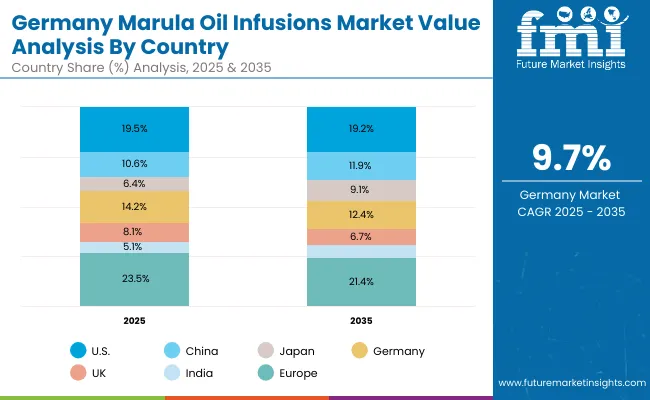
| Countries | 2025 Share (%) |
|---|---|
| USA | 19.5% |
| China | 10.6% |
| Japan | 6.4% |
| Germany | 14.2% |
| UK | 8.1% |
| India | 5.1% |
| Countries | 2035 Share (%) |
|---|---|
| USA | 19.2% |
| China | 11.9% |
| Japan | 9.1% |
| Germany | 12.4% |
| UK | 6.7% |
| India | 5.7% |
The Marula Oil Infusions Market in Germany is projected to grow at a CAGR of 9.7% through 2035, reflecting steady but moderate expansion compared to Asia-Pacific markets. Germany maintains one of the largest shares in Europe due to its pharmacy-led skincare culture and strong consumer preference for dermatologist-tested and organic-certified formulations. However, its global share is forecast to decline slightly from 14.2% in 2025 to 12.4% in 2035, as faster-growing Asian markets capture more value.
German consumers place high trust in natural oils backed by scientific validation, making marula oil particularly attractive for moisturizing and anti-aging applications. Pharmacies and specialty beauty stores dominate sales, while premium brands highlight eco-certifications and sustainable sourcing to align with EU standards. Clean-label and vegan claims also contribute to growth, though adoption is more cautious and evidence-driven compared to trend-driven Asian markets.
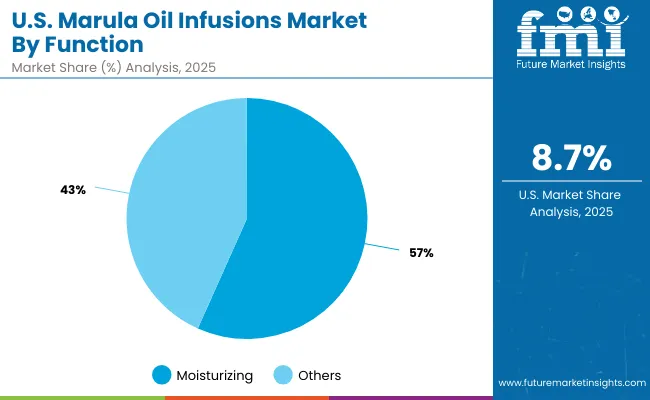
| USA by function | Value Share% 2025 |
|---|---|
| Moisturizing | 56.7% |
| Others | 43.3% |
The Marula Oil Infusions Market in the United States is projected at USD 223.27 million in 2025, expanding to USD 727.01 million by 2035 at a CAGR of 12.5%. The market is strongly anchored by moisturizing applications, which lead with 56.7% share in 2025, as consumers prioritize hydration-focused products that support barrier repair and long-lasting softness.
American consumers are also driving growth in anti-aging and multi-functional serums, where marula oil’s antioxidant-rich composition is positioned against oxidative stress and early signs of aging. Growth is reinforced by the popularity of vegan and dermatologist-tested claims, e-commerce subscription models, and premium product launches by leading clean beauty brands.
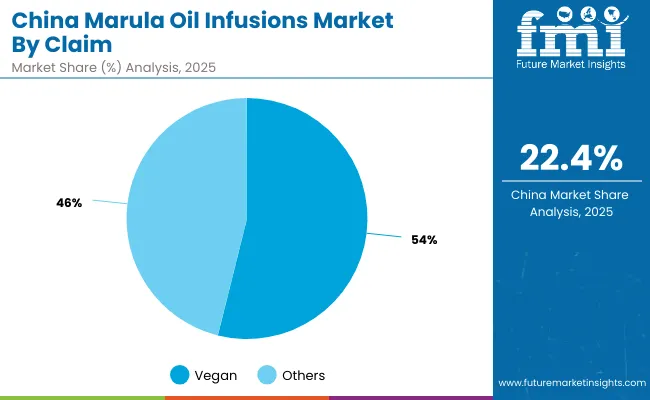
| China by Claim | Value Share% 2025 |
|---|---|
| Vegan | 53.9% |
| Others | 46.1% |
The Marula Oil Infusions Market in China is projected to grow at a CAGR of 22.4%, supported by strong consumer adoption of vegan-certified skincare, which dominates at 53.9% in 2025. This reflects the rising importance of ethical and plant-based formulations, with marula oil gaining traction for its hydration, anti-aging, and skin repair benefits. Opportunities are amplified by C-beauty innovation and the rapid rise of social commerce platforms such as Douyin and Little Red Book, which play a key role in educating consumers and driving trial purchases. Affordable domestic offerings cater to mass-market buyers, while premium international brands focus on fair-trade sourcing and clean-label transparency to capture affluent consumers.
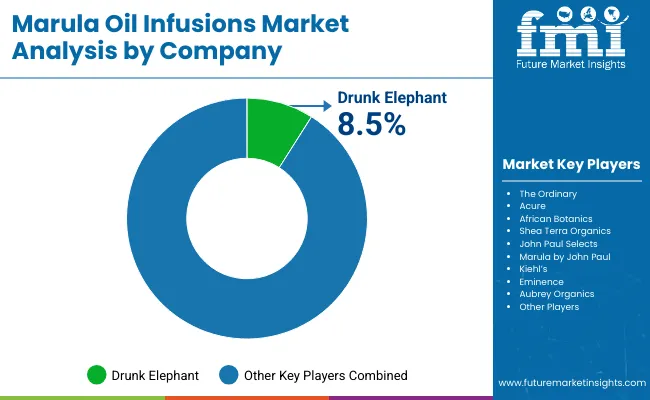
| Comapny | Global Value Share 2025 |
|---|---|
| Drunk Elephant | 8.5% |
| Others | 91.5% |
The Marula Oil Infusions Market is moderately fragmented, with global leaders, niche innovators, and clean-beauty specialists competing across both premium and mass skincare segments. Global leaders such as Drunk Elephant, Kiehl’s, and The Ordinary maintain strong positions through premium branding, dermatologist-tested claims, and extensive e-commerce presence. Their strategies emphasize marula oilinfused serums and oils, highlighting hydration, anti-aging, and clean-label positioning to secure loyal consumer bases in North America and Europe.
Mid-sized innovators including Acure, African Botanics, and Shea Terra Organics focus on fair-trade sourcing, natural formulations, and eco-conscious packaging. These brands appeal strongly to consumers seeking affordable yet ethical alternatives, particularly in North America and Asia-Pacific. Niche-focused players such as Eminence, Aubrey Organics, and John Paul Selects emphasize artisanal blends, organic certifications, and holistic skincare routines. Their adaptability to local consumer needs and targeted marketing allows them to retain presence despite limited global scale.
Competitive differentiation is shifting from brand heritage alone to a broader focus on sustainability credentials, transparency in sourcing, and direct-to-consumer engagement. Companies that integrate ethical sourcing stories, innovative product formats, and digital-first marketing are expected to strengthen their foothold in this growing market.
Key Developments in Marula Oil Infusions Market
| Item | Value |
|---|---|
| Quantitative Units | USD 1,052.8 Million |
| Function | Moisturizing, Anti-aging, Brightening, Repair |
| Product Type | Oils, Creams/lotions, Serums, Masks |
| Channel | E-commerce, Pharmacies, Mass retail, Specialty beauty stores |
| Claim | Vegan, Natural/organic, Clean-label, Dermatologist-tested |
| Regions Covered | North America, Europe, Asia-Pacific, Latin America, Middle East & Africa |
| Country Covered | United States, Canada, Germany, France, United Kingdom, China, Japan, India, Brazil, South Africa |
| Key Companies Profiled | Drunk Elephant, The Ordinary, Acure, African Botanics, Shea Terra Organics, John Paul Selects, Marula by John Paul, Kiehl’s, Eminence, Aubrey Organics |
| Additional Attributes | Dollar sales by scanner type and end-use industry, adoption trends in reverse engineering and quality control, rising demand for handheld and portable 3D scanners, sector-specific growth in aerospace, automotive, and healthcare, software and services revenue segmentation, integration with AR/VR and digital twin technologies, regional trends influenced by digitization initiatives, and innovations in laser triangulation, structured light, and photogrammetry methods. |
The global Marula Oil Infusions Market is estimated to be valued at USD 1,052.8 million in 2025.
The market size for the Marula Oil Infusions Market is projected to reach USD 3,562.7 million by 2035.
The Marula Oil Infusions Market is expected to grow at a 13.0% CAGR between 2025 and 2035.
The key product types in the Marula Oil Infusions Market are Oils, Creams/lotions, Serums, and Masks, with oils holding the leading share at 50.5% in 2025, followed closely by creams/lotions and serums as emerging formats for targeted skincare.
In terms of claims, the Vegan segment is projected to command 53.9% share in 2025 in the China market, making it a significant growth driver globally. Overall, vegan and natural/organic claims are expected to lead adoption across all product types.






Full Research Suite comprises of:
Market outlook & trends analysis
Interviews & case studies
Strategic recommendations
Vendor profiles & capabilities analysis
5-year forecasts
8 regions and 60+ country-level data splits
Market segment data splits
12 months of continuous data updates
DELIVERED AS:
PDF EXCEL ONLINE
Oil-immersed Iron Core Series Reactor Market Size and Share Forecast Outlook 2025 to 2035
Oil and Gas Sensor Market Forecast Outlook 2025 to 2035
Oil Packing Machine Market Forecast and Outlook 2025 to 2035
Oil and Gas Pipeline Coating Market Forecast and Outlook 2025 to 2035
Oilfield Scale Inhibitor Market Size and Share Forecast Outlook 2025 to 2035
Oil-in-Water Anionic Emulsifier Market Size and Share Forecast Outlook 2025 to 2035
Oil and Gas Field Services Market Size and Share Forecast Outlook 2025 to 2035
Oil Control Shampoo Market Size and Share Forecast Outlook 2025 to 2035
Oil Expellers Market Size and Share Forecast Outlook 2025 to 2035
Oilfield Stimulation Chemicals Market Size and Share Forecast Outlook 2025 to 2035
Oiler Kits Market Size and Share Forecast Outlook 2025 to 2035
Oil Pressure Sensor Market Size and Share Forecast Outlook 2025 to 2035
Oil Filled Power Transformer Market Size and Share Forecast Outlook 2025 to 2035
Oily Skin Control Products Market Analysis - Size and Share Forecast Outlook 2025 to 2035
Oil Immersed Shunt Reactor Market Size and Share Forecast Outlook 2025 to 2035
Oil Country Tubular Goods Market Size and Share Forecast Outlook 2025 to 2035
Oil Filled Distribution Transformer Market Size and Share Forecast Outlook 2025 to 2035
Oilfield Communications Market Size and Share Forecast Outlook 2025 to 2035
Oil & Gas Electrification Market Size and Share Forecast Outlook 2025 to 2035
Oil and Gas Accumulator Market Size and Share Forecast Outlook 2025 to 2035

Thank you!
You will receive an email from our Business Development Manager. Please be sure to check your SPAM/JUNK folder too.
Chat With
MaRIA